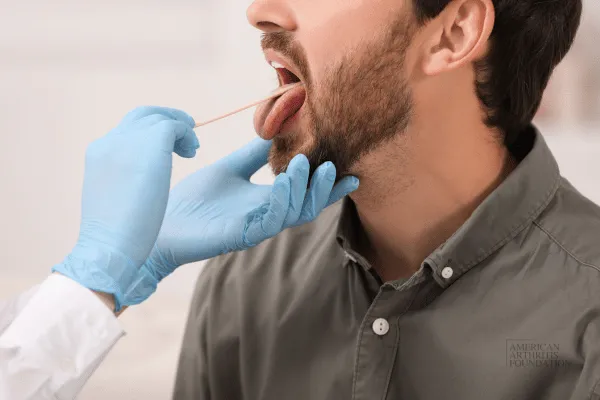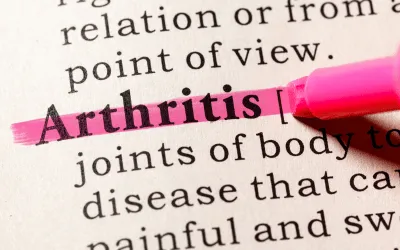About Arthritis
As the nation’s #1 cause of disability, arthritis affects nearly 60 million adults and 300,000 children. Over 100 types of arthritis and related conditions damage the joints and often other organs.
How can we assist you?
Helpful Tools for You

Can Oral Health Impact Rheumatoid Arthritis? New Study Sheds Light
When thinking about rheumatoid arthritis (RA), we typically focus on joints, inflammation, and medications, but there may be another factor influencing RA symptoms that’s often overlooked: oral health. Surprising new research from Tokyo Medical and Dental University (TMDU) has uncovered a link between gum disease and RA, suggesting that bacteria in your mouth could be making your arthritis symptoms worse.
What’s the Connection Between Gum Disease and RA?
Gum disease, also known as periodontal disease, is a common condition that affects the tissues surrounding the teeth. It’s caused by bacteria forming plaque on your teeth and, if left untreated, can lead to gum inflammation, infection, and eventually tooth loss. But the effects of gum disease don’t stop there. Research over the years has shown that gum disease may contribute to systemic health problems, including autoimmune conditions like RA.
In this new study, researchers explored the relationship between a specific oral bacterium, Aggregatibacter actinomycetemcomitans (a mouthful, we know), and its effect on RA symptoms. This bacterium is known to be a key player in gum disease, and now it seems to be involved in worsening joint inflammation in RA patients as well.
How Oral Bacteria May Worsen RA Symptoms
To investigate the role of oral bacteria in RA, the TMDU team used a mouse model of arthritis, which closely mimics the progression of RA in humans. They found that mice infected with A. actinomycetemcomitans experienced more severe arthritis symptoms, including joint swelling, increased inflammation, and higher levels of a key inflammatory protein, interleukin-1β (IL-1β).
But here’s the most interesting part: macrophages, a type of immune cell, were at the center of this increased inflammation. Macrophages typically help protect the body by fighting off harmful bacteria, but in this case, they seemed to go into overdrive, making the inflammation in the joints worse. When the researchers depleted macrophages in the mice, the arthritis symptoms improved significantly, suggesting that these immune cells play a critical role in how oral bacteria worsen RA.
Additionally, the researchers looked at how A. actinomycetemcomitans activates something called the inflammasome—a complex within immune cells that responds to infections. The study found that this activation was a major driver of inflammation in RA, adding another piece to the puzzle of how oral bacteria affect joint health.
What These Findings Mean for RA Treatment
The discovery that oral bacteria can worsen RA symptoms opens up new possibilities for managing the disease. Inhibiting the pathways that lead to inflammasome activation and reducing the harmful effects of macrophages could offer new treatment options for RA patients who are also dealing with gum disease.
Dr. Tokujii Okano, the lead author of the study, believes this research could contribute to the development of new therapies for not only rheumatoid arthritis but also other conditions linked to oral bacteria, such as Alzheimer’s disease. “The outcome of our work may help in developing strategies to manage both RA and other systemic diseases connected to periodontal pathogens,” Dr. Okano explains.
Why RA Patients Should Pay Attention to Oral Health
So, what does this all mean for people living with rheumatoid arthritis? It’s a reminder of how interconnected our bodies truly are. Oral health isn’t just about keeping your teeth and gums healthy—it could also play a role in managing chronic diseases like RA. If you’re living with RA, keeping up with regular dental visits, practicing good oral hygiene, and addressing any signs of gum disease could be important steps in controlling inflammation and protecting your joints.
This research reinforces the importance of taking a holistic approach to managing RA. By caring for your oral health, you may not only prevent gum disease but also reduce the risk of aggravating your arthritis symptoms.
Takeaway: Oral Health and RA – A Vital Connection
The connection between oral bacteria and rheumatoid arthritis is becoming clearer, and it’s giving patients and healthcare providers another avenue to explore for better disease management. While more research is needed to fully understand this relationship, one thing is certain: taking care of your gums may help take care of your joints too.
At the American Arthritis Foundation, we are committed to sharing the latest research and tips to help you live well with RA. This study from TMDU reminds us that our health is a whole-body experience, and managing one condition could have benefits far beyond what we expect.
Effects of Arthritis

Cause of Disability
In the United States, 23% of all adults, or more than 54 million people, have arthritis. It is a leading cause of work disability, with annual costs for medical care and lost earnings of $303.5 billion.

Workforce Effects
Sixty percent of US adults with arthritis are of working age (18 to 64 years). Arthritis can limit the type of work they are able to do or keep them from working at all.

Global Impact
In fact, 8 million working-age adults report that their ability to work is limited because of their arthritis. For example, they may have a hard time climbing stairs or walking from a parking deck to their workplace.
Promoting Interventions That Reduce Arthritis Pain
American Arthritis Foundation recognizes several proven approaches to reduce arthritis symptoms:
Be active. Physical activity—such as walking, bicycling, and swimming—decreases arthritis pain and improves function, mood, and quality of life. Adults with arthritis should move more and sit less throughout the day. Getting at least 150 minutes of moderate-intensity physical activity each week is recommended.
Protect your joints. People can help prevent osteoarthritis by avoiding activities that are more likely to cause joint injuries.
Talk with a doctor. Recommendations from health care providers can motivate people to be physically active and join a self-management education program. Should your arthritis be interfering with your activities of daily living you may be a candidate to receive many new treatments, and learn how to reverse the arthritis condition.
Have a question?
We're Here to Help
By providing my phone number, I agree to receive text messages from the business.


